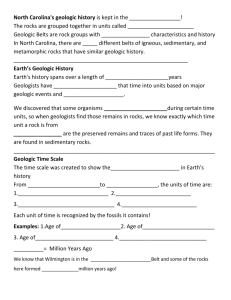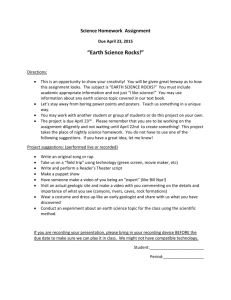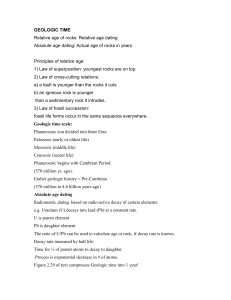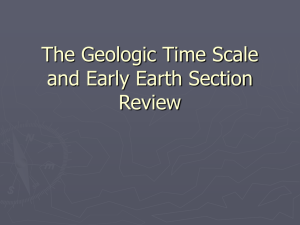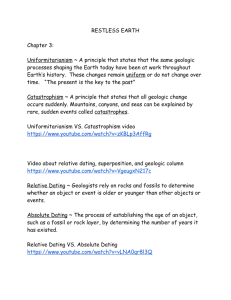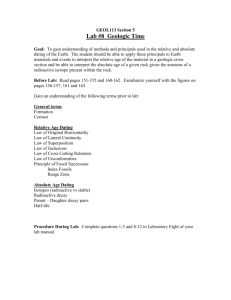Chapter_4_Geologic T..
advertisement
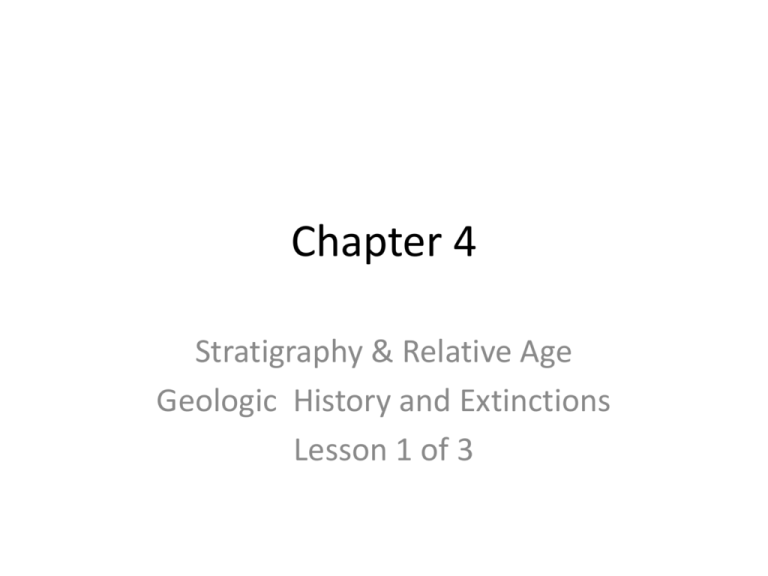
Chapter 4 Stratigraphy & Relative Age Geologic History and Extinctions Lesson 1 of 3 Quote Science of Today • During his Zurich stay the woman doctor, Paulette Brubacher, asked the whereabouts of his [Einstein's] laboratory. With a smile he took a fountain pen out of his breast pocket and said: 'here'. ~Albert Einstein~ • I chose this most brief quote by Albert Einstein because it reminds me that the time to create is always HERE & NOW! I think it is important to log down any insight or idea no matter how slight it may seem. Even the smallest sliver of information can make all the difference when you put all the pieces together. Old view of formation of Rocks • 17th Century • Catastrophism.- is the theory that the Earth has been affected in the past by sudden, short-lived, violent events Early Thoughts on the Origin Of Rocks • Neptunism .- Rocks were created from water having crystallized from earth’s First Oceans • Plutonism.- All rocks originated from Volcanoes pressure and heat into Other Rocks Stratigraphy • Nicolas Steno 1638-1686 (Father of Modern Stratigraphy) 1. Principle of Original Horizontality 2. Principle of Superposition 3. Principle of Cross-Cutting Relationship 4. Principle of Lateral Continuity 5. Principle of Inclusions 6.- Principle of Faunal Succession Principle of Original Horizontality Principle of Original Horizontality San Juan River, Utah Canadian Rockies, Alberta Principle of Superposition Principle of Cross-Cutting Relationships Igneous intrusion Faulted rock Principle of Inclusions Principle of inclusions Grand Canyon Principle of Faunal (fossil) Succession Index Fossils Def.: accurately indicate the ages of sedimentary rocks 1) Abundantly preserved in rocks 2) Geographically widespread 3) Fast evolving - existed for a relatively short time 4) Easily identified James Hutton ( Modern Geology) Siccar Point @ Scotland Siccar Point UNIFORMITARIANISM • UNIFORMI…… What ? • “The Present is the Key to the Past “ • Rate and intensity of past process were they same as those observed today. • This principle is still the foundation of geologic science UNIFORMITARIANISM Current understanding of Uniformitarianism in geology is no longer makes this assumption Rates and intensity of process ( Different conditions on earth trough time) Catastrophes do play a role ( Chicxulub, Massive volcanic Flows) UNCONFORMITIES Breaks in the rock record. (time missing in the Geologic record) a) Angular Unconformities.- When Rocks are tilted at angle by uplifting, faulting or folding b) Disconformity .- Is difficult to see because both layers are sedimentary rocks and both are still horizontal but they are separated by the surface that got eroded. c)Nonconformity .- Is abreak in time between a metamorphic or intrusive igneous rock and layers of Sedimentary rocks created above it. Angular Unconformity Disconformity Nonconformity Unconformities • Unconformities • Geologic Time Record Chapter 4 • Absolute Age • Geologic History and Extinctions • Lesson 2 of 3 Science Quote "Anybody who has been seriously engaged in scientific work of any kind realizes that over that same entrance to the gates of the temple of science are written the words: 'Ye must have faith'" Max Planck • Anacany Ramirez Review Stratigraphy Conformable Principles • • • • • • Unconformities Principle of Original Horizontality a) Angular Unconformities.b) Disconformity .Principle of Superposition c)Nonconformity Principle of Lateral Continuity Principle of Cross-Cutting Time missing from the rock layers. Breaks Relationship in the rock record Principle of Inclusions Principle of Fossil Succession Assumption that the rocks you examine have undisturbed and complete record Relative Dating: Correlation How old is that rock? Relative age: order of events Relative dating tells us what order things happened, but not how many years ago they happened. Absolute age: age in years Absolute Dating: Radioactive Decay Half Life • • • • • 1 gram of K-40 (Potassium 40 ) (Half Life 1.3 Billion Years) .50 gram Half Life 1.3 Billion Years) .25 Another Half-life Example • You start with $1000 in your bank account • Every week your spouse or boyfriend/girlfriend removes half of the money • The half-life of your account = 1 week 1 week Your Bank Account (1 half-life) • • • • • • • • • • Start: $1000 Week 1: $500 Week 2: $250 Week 3: $125 Week 4: $62.50 Week 5: $31.25 Week 6: $15.63 Week 7: $7.81 Week 8: $3.90 Week 9: $1.95 • • • • • • • Week 10: $0.98 Week 11: $0.49 Week 12: $0.24 Week 13: $0.12 Week 14: $0.06 Week 15: $0.03 Week: 16: $0.015 left in your bank account Isotopes & Half Lives Young things Old things Radiometric Dating Is the process of determining the absolute age of rocks, minerals and fossils by measuring the relative amounts of parent and daughter isotopes Radioactive Decay Curve Calculating Absolute Age • Potassium-40 included in mineral (start clock) • Begins decaying to Argon-40 • Brilliant scientists have told us the half-life of K-Ar is 1.3 billion yrs (Gyr) • We count # parents & daughters in sample • We find that our sample contains 50% K & 50% Ar • So 1/2 of our initial sample (K) has decayed • How old is it? • We find another sample that is 25% K & 75% Ar • How old is it? Continue with chapter 4 • Class 3 of 3 “I don’t drink water, because if water can erode rock, think what it can do to flesh. ” ― Jarod Kintz, Amanda Barraza Earth Rocks, Earth History, and Mass Extinctions • The fossil record suggest that sudden, catastrophic events, abruptly decimated Life on earth. • But, New life forms emerged following mass extinctions Mass Extinctions Hypothesis for mass extinctions • Extraterrestrial Impacts • Volcanic Eruptions • Supercontinents Systems interactions among Biosphere, Geosphere, Atmosphere. Hydrosphere EXAMPLE: Permian Extinction: 90 % of all species in oceans died 70% of reptiles and amphibians 30% of all insects A Bad Day…. 65 Million Years Ago Chicxulub crater gravity anomaly Mass Extinctions: Extraterrestrial Impacts Astronomical Impacts 1. LARGE OBJECT HITS EARTH.- the impact sends large amounts of rock and other debris in to Atmosphere and it starts fires, which add some and ash to the Atmosphere 2.- The Atmosphere is polluted. Particles of ash and rock in the atmosphere do 3 Things : • Block sun light • Block sun warmth, leading to global cooling • Create conditions for acid rain. Also This darkened atmosphere may also be very difficult to breath in 3. Plant Life gets affected. The combination of acid rain, cooler temperatures, and the absence of sunlight SHUTS DOWN the process of Photosynthesis. Brings Plant Life TO A HALT 4.- Hervibores are affected next. Without plants no food. 5 The Entire ecosystem collapses Mass Extinctions: Volcanic Eruptions The Siberian trap basalts formed 250 million years ago at the Permian/Triassic boundary with a volume of 2.5 million cubic kilometers Fig. 4-2, p.75 Example Eruptions: Global distribution of large igneous provinces in the oceans (submarine plateaus) and on land (flood basalts) Mass Extinctions: Atmosphere-Ocean-Continent Interactions Ocean Conveyor Mass Extinctions: Atmosphere-Ocean Interaction (1) Fig. 4-2, p.75 Mass Extinctions: Atmosphere-Ocean Interaction (2) Mass Extinctions: Atmosphere-Ocean-Continent Interactions Mass Extinctions: Ocean-Continent Interaction Pangea Geologic time (millions of years) Geologic Time & Biology Geologic time (millions of years) Geologic Time & Biology Fig. 4-1b, p.74 Geologic time (millions of years) Geologic Time & Biology Geologic Time Major divisions Cenozoic: 66 - 2.5 m.y.a Mesozoic: 245 - 66 m.y.a. Paleozoic: 544 - 245 m.y.a. Precambrian: pre-544 m.y.a. (proterozoic) Geologic Time Earth History in One Year

